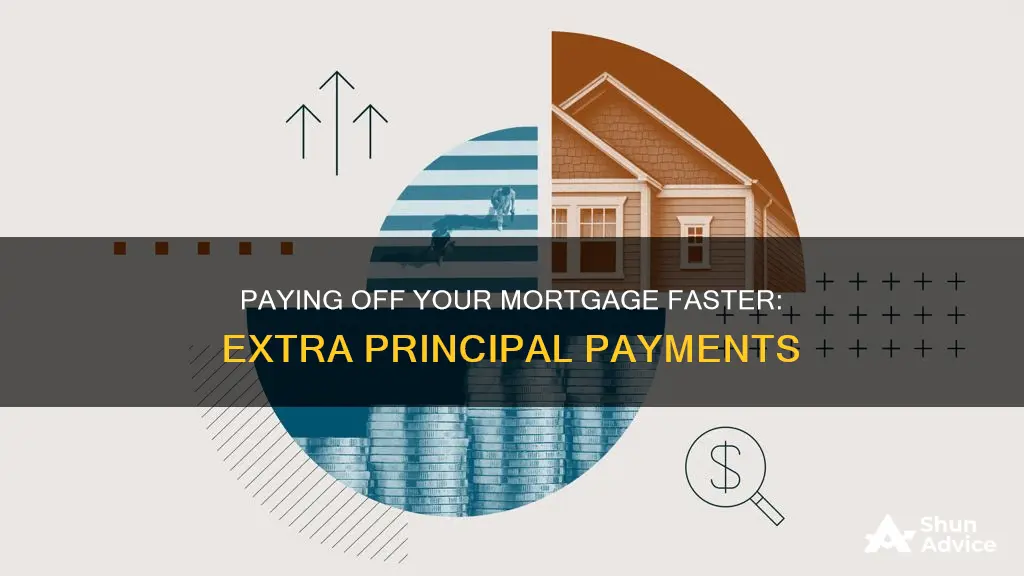
Paying extra principal on a mortgage can help you save money in the long run and pay off your mortgage faster. By making more than the minimum monthly payment, you can reduce the principal balance, which can lead to early payoff and reduce the amount in interest charges you pay over the life of the loan. However, it's important to consider your entire financial picture before making extra payments, as there may be more effective uses of your money, such as paying off credit card debt or building an emergency fund.
| Characteristics | Values |
|---|---|
| Interest savings | By adding extra principal to a mortgage, you can save money in the long run by reducing the amount of interest paid over the life of the loan. |
| Early payoff | Adding extra principal can help pay off the mortgage faster. |
| Equity buildup | Extra payments towards the principal balance of a mortgage may help build equity in the home at a faster rate. |
| Financial flexibility | Paying off the mortgage early may provide greater financial flexibility and enhance overall financial well-being. |
| Possibility of selling your home | Making extra payments may put you in a stronger position when searching for a new home. |
| Budgeting | It is important to consider your monthly budget and ensure that making extra payments does not make it too tight. |
| Prepayment penalties | Check for any prepayment penalties in your mortgage agreement before making extra payments. |
| Opportunity cost | If you pay extra towards the principal, you won't be able to use that money for anything else. |
What You'll Learn

Saving on interest
Paying extra on your mortgage principal can help you save on interest costs. This is because the interest you pay is calculated based on the remaining principal balance. By paying down more of the principal, you reduce the interest charged on it. Over the life of the loan, this can lead to substantial interest savings, potentially amounting to thousands of dollars.
For example, consider a $250,000 mortgage with a 30-year term and an 8.5% APR interest rate. Without any extra payments, you would pay a total of $692,022.14 in principal and interest over the 30-year term. However, by paying an additional $100 every month towards the principal, you could pay off the mortgage about 5 years sooner and the final amount paid would be $597,297.21, resulting in savings of almost $94,725 in interest.
There are several ways to make extra payments towards your mortgage principal. One approach is to make frequent payments, such as biweekly payments or paying a little extra each month. Another method is to save up and make one large annual payment. You can also choose to pay more on each monthly instalment. Whichever approach you choose, it is important to specify that the extra payment is meant to be applied to the principal balance. This will ensure that the additional amount reduces the principal and the interest charged on it, rather than being applied to future interest payments or the next monthly instalment.
While paying extra on your mortgage principal can lead to significant interest savings, it is important to consider your entire financial picture. For example, if you have high-interest credit card debt, it may be more beneficial to focus on paying off that debt first. Additionally, if you have a 401(k) and your employer matches your contributions, it may be more advantageous to maximise those contributions instead, as you can earn a higher rate of return in the long run.
Secondary Residence: Mortgage Impact and Considerations
You may want to see also

Building equity faster
Paying extra towards the principal balance of your mortgage is a great way to build equity faster. Equity is the difference between the current value of your home and your outstanding mortgage balance. By adding extra to your principal, you are lowering your loan-to-value ratio (LTV). This means that you are increasing your ownership stake in the property.
Making extra payments on your mortgage may be a great way to save money in the long run and pay off your mortgage faster. By making more than just the minimum monthly payment on your mortgage, you can reduce the principal balance, which can lead to an early payoff and a reduction in the amount of interest charged over the life of the loan.
The impact of extra payments is greater early in the mortgage. This is because, at the beginning of a mortgage, the amount of interest you pay each month is much higher than the amount of principal. Therefore, even small extra payments at the beginning of a mortgage can have a big impact on the payment schedule.
There are several strategies you can employ to make extra payments towards your principal. You can make biweekly payments, periodic extra payments, or a lump sum. A biweekly payment plan involves making half of your monthly payment every two weeks, resulting in an extra payment each year. With the additional lump sum payment, you make a one-time payment towards your principal balance. You can also choose to pay an extra monthly payment once a year.
Before making additional mortgage payments, it is important to consider your entire financial picture. You should ensure that your money is not better suited for other purposes, such as an emergency fund or retirement savings. Additionally, check for any prepayment penalties in your mortgage agreement.
Lawsuits and Mortgages: What You Need to Know
You may want to see also

Financial flexibility
The impact of extra principal payments is more pronounced earlier in the mortgage term. For example, a borrower with a $1,600 monthly mortgage payment, of which only $300 goes towards the principal, made an additional payment of $2,000 each month for a little over a year. As a result, their 30-year mortgage became a 28-year one, demonstrating the power of extra payments in the initial years.
It is important to carefully consider your financial situation and ensure that your money is not better suited for other purposes, such as an emergency fund or retirement savings. Additionally, it is crucial to communicate with your lender and specify that any extra payments should be applied directly to the principal balance to achieve the desired outcome of reducing the loan term and interest expenses.
While adding extra principal to a mortgage can provide financial flexibility, it is important to be cautious and ensure that your monthly budget can accommodate any additional payments without causing financial strain. It is also worth considering the potential opportunity cost of making extra principal payments, as those funds could be invested or utilized for other financial goals.
Overall, adding extra principal to a mortgage can provide borrowers with greater financial flexibility by reducing the loan term and interest expenses, resulting in lower monthly payments and increased disposable income. However, it is important to carefully assess your financial situation and ensure that the extra payments align with your short-term and long-term financial goals.
Mortgage Fraud: Reporting and Protecting Your Finances
You may want to see also

Lump sum payments
There are several benefits to making a lump sum payment. Firstly, it can help you save money on interest. By reducing the principal balance, you will pay less interest over the life of the loan. This can amount to tens of thousands of dollars in savings, depending on the loan amount and interest rate. Secondly, lump sum payments can help you build equity in your home faster. Equity is the difference between the current value of your home and your outstanding mortgage balance. By reducing the principal balance, you increase your ownership stake in the property. Finally, paying off your mortgage early through a lump sum payment can provide you with greater financial flexibility. Without a monthly mortgage payment, you will have more disposable income to allocate towards other financial goals.
However, there are also some considerations to keep in mind when deciding whether to make a lump sum payment. Firstly, there is an opportunity cost involved. Paying extra towards your principal means that you cannot use that money for anything else. Therefore, it is important to ensure that you have a sufficient emergency fund and that you are not carrying high-interest debt before making a lump sum payment. Additionally, it is important to check for any prepayment penalties in your mortgage agreement, as these could offset some of the savings you would achieve by paying off your mortgage early. Finally, if you are planning to sell your home in the near future, you may not see much benefit from making a lump sum payment, as the interest savings are realised over the long term.
Understanding the Components of a Mortgage Note
You may want to see also

Budgeting
When considering extra principal payments, individuals should evaluate their entire financial situation. This includes assessing whether their monthly budget is already tight after covering essential expenses, if their income is variable or unpredictable, the length of their stay in the home, the status of their emergency savings fund, and their retirement savings progress. If there are other pressing financial priorities or limited discretionary funds, it may be more prudent to allocate funds to those areas first.
One strategy to make extra principal payments more manageable within a budget is to increase the frequency of payments. This can be achieved through biweekly mortgage payments, where the monthly payment is split in half and paid every two weeks, resulting in 13 monthly payments per year. Another approach is to make frequent, smaller additional payments throughout the year, such as adding a small fraction of the minimum monthly payment to each instalment. These strategies can help distribute the financial burden more evenly and may be more feasible for those with limited discretionary funds.
It is also essential to consider the potential impact on interest savings. Paying extra principal can lead to substantial interest savings over the life of the loan. However, individuals should assess whether they have high-interest debt, such as credit card balances, that could be prioritised for repayment first. Additionally, it is worth checking for any prepayment penalties or fees associated with extra principal payments, as these could offset some of the potential savings.
In summary, while adding extra principal to a mortgage can provide significant financial benefits, it is crucial to ensure that it aligns with one's budget and financial goals. Individuals should carefully evaluate their financial situation, consider the potential impact on interest savings, and explore different payment strategies to determine the most suitable approach for their circumstances.
Removing the Deceased's Name from a Mortgage
You may want to see also
Frequently asked questions
Adding extra principal to your mortgage helps you to pay off your loan sooner, build equity in your home faster, and save money on interest.
To earmark extra money for your mortgage principal, you must specify to your lender that the extra payment is meant to be applied to the principal balance. This will ensure that the additional amount is reducing the principal amount rather than being put towards future interest payments. The method for earmarking your additional payment is usually simple, but it varies by lender, so be sure to ask for instructions.
The amount you pay towards your mortgage principal depends on your financial situation. You can determine how much extra you can comfortably afford to pay towards your mortgage each month. Even a small additional amount may lead to a significant impact over time.







